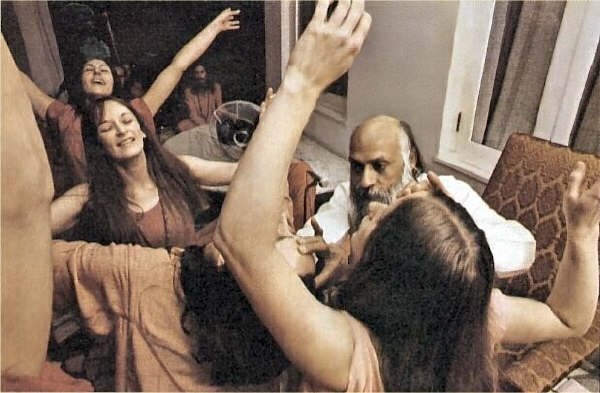More you will love me, the more you will love the whole existence, the more you will love yourself. And as that love deepens, you start disappearing. There is only love — and love is not an attachment. The attachment is of the `I’. OSHO
The way of love is the way of no-expectation. Love exists only when there is total acceptance and no desire to change anything.
The moment you start thinking of how the other should be… whether the other is your lover, your beloved, your child, your master, your disciple… it does not matter who the other is. What matters is a total acceptance of the other As he is. Not tolerance — tolerance is an ugly word. In the very word “tolerance” there is intolerance. The very word smells as if somehow against your will you are managing it: it is not a loving acceptance but an unloving tolerance.
It is true that it has taken me a long, long journey to find only those people who can understand me, accept me, love me as I am. I have never asked anybody to be somebody other than who he is. But for thousands of years all the religions have lived in a nightmare, in a very strange and weird situation.
The disciples were demanding how the master should be, the master was demanding how the disciples should be. One can understand the demand from the side of the master: you have come to him to be transformed, to be changed; it is understandable if he wants certain disciplines to be followed. But it is absolutely not understandable that the disciples, the followers, should also demand how the master should be. And the wonder of wonders is that the masters have been fulfilling the desires of those who are their followers.
The leaders have been followers of their own followers. To remain in the dominant position of being a master they have compromised; it is a mutual compromise: “I will fulfill your demands, you fulfill my demands.” And this has been going on for thousands of years.
A real master, an authentic master, a man who knows, is not going to accept any demand from those who do not know. He cannot fulfill your desires, your idea of how a master should be. But your so-called masters have been doing exactly that. If you wanted them to be naked, they remained naked; if you wanted them to fast, they fasted; if you wanted them to do certain yoga exercises, they did them. Whatever you wanted, they did, in order to remain in power, dominating you, dictating your life.
And of course the disciple was the loser, because these people managed to fulfill the demands of the followers… but the followers were not capable of fulfilling the demands of the masters, so they were condemned as sinners. All the religions created nothing but guilt in the human mind, a deep feeling of inferiority, a sense of failure, a kind of hatred for oneself, one’s weaknesses, frailties. They destroyed people’s self-respect. And no crime can be greater than that, because once a person loses self-respect he loses his very soul; he loses his manhood, he falls into a subhuman existence.
It has been a very strange nightmare, tremendously painful to the whole of humanity. A few cunning people — unintelligent but stubborn, stupid but adamant — managed to do all kinds of irrational things, and because others could not do them, they became great saints.
I am reminded of an old Tibetan story.
There were two monasteries: one monastery was in Lhasa, in the capital of Tibet, and one of its branches was deep in the faraway mountains. The lama who was in charge of the monastery was getting old, and he wanted somebody to be sent from the chief monastery to be his successor. He sent a message.
A lama went there — it was a few weeks’ journey by foot. He told the chief, “Our master is very sick, old, and there is every possibility that he will not survive for long. Before his death, he wants you to send another monk, well trained, to take charge of the monastery.”
The chief said, “Tomorrow morning you take them all.”
The young man said, “Take them all? I have come only to take one. What do you mean, take them all?”
He said, “You don’t understand. I will send one hundred monks.”
“But,” the young man said, “this is too much. What are we going to do? We are poor and in those parts, the monastery is poor. One hundred monks will be a burden to us, and I have come here to ask only for one.”
The chief said, “Don’t be worried, only one will reach. I will send one hundred, but ninety-nine will be lost on the way. You will be fortunate even if one reaches.”
He said, “Strange…”
On the next day, a long procession started, one hundred monks, and they had to go across the country. Everybody had his house somewhere on the way and people started dispersing… “I will be coming. Just a few days with my parents… I have not been there for years.” Within just a week there were only ten people.
The young man said, “The old chief was perhaps right. Let us see what happens to these ten people.
Just as they entered a town, a few monks came and said that their chief had died: “So it will be very kind of you — you are ten, you can afford to give one lama to us as a chief — and we are ready to do everything, whatever you want.” Now everybody was ready to become the chief. Finally they decided upon one person and he was left behind.
In another city, the king’s men came and they said, “Wait; we need three monks because the king’s daughter is being married and we need three priests. That is our tradition. So either you come willingly, or we will take you unwillingly.”
Three men disappeared; only six were left. And in this way they went on disappearing.
Finally only two persons were left.
And as they were coming closer to the monastery… it was evening and a young woman met them on the road. She said, “You are such compassionate people. I live here in the mountains — my house is just there. My father is a hunter, my mother has died. And my father has gone, and he promised to return today but he has not returned. And I am very much afraid to remain alone in the night… just one monk, just for one night.”
Both of them wanted to stay! The young woman was so beautiful that it was a great struggle. The young man who had come as a messenger had seen those one hundred people disappearing, and now finally… Finally they said to the woman, “You can choose either one, because otherwise there is going to be unnecessary fighting. And we Buddhist monks are not supposed to fight.
She chose the youngest, the most beautiful monk, and she disappeared into her house. The other monk said to the young man, “Now come on. That man is not going to come back; forget all about him.”
The young man said, “But now, you remain strong — the monastery is very close.”
And just before the monastery, in the last village, an atheist challenged the monk: “There is no soul, no God. This is all fiction, this is just to exploit people. I challenge you to a public debate.”
The young man said, “Don’t get into this public debate, because I don’t know how long it will last. And my chief must be waiting — perhaps he may have already died.”
The monk said. “This will be a defeat, a defeat of Buddhism. Unless I defeat this man, I cannot leave this place. The public debate will happen, so inform the whole village.”
The young man said, “This is too much! Because your master said at least one would reach, but it seems that only I will reach.”
He said, “You get lost. I am a logician, and I cannot tolerate this kind of challenge. It will take months. We are going to discuss everything in detail because I know, I have heard about this man. He is also a very intellectual, philosophical man. You can go, and if I succeed in the debate I will come. If I am defeated, then I will have to become his follower; then don’t wait for me.”
He said, “This is too much.”
He reached the monastery. The old man was waiting, He said, “You have come? How many had started?”
He said, “One hundred and one, including me.”
The old man said, “That’s perfectly good. At least you have come back. You be my successor; nobody out of those hundred is going to come now.”
And the master knew it, that only one would reach.
It is an old proverb in Tibet that hundreds go but rarely a single individual reaches — that too, rarely. Many have come into contact with me, have been deeply connected with me, have looked very devoted. But I knew that so many people could not stay with me. It is not a journey for all, it is a journey only for the chosen few. All their devotion will disappear like a dewdrop in the early morning sun. Just a small excuse is enough — and they will find the excuse. And particularly around a man like me, who follows no scripture, who follows no tradition, who is a law unto himself. Only a very few courageous people are going to remain.
Now I am talking to those people who don’t have any expectations from me. And they are perfectly aware that I don’t have any expectations from them.
Now it is a pure love without any conditions attached to it. Only in this purity of love are miracles possible — and they are happening.
OSHO


